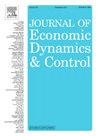Social learning and expectational stability
IF 1.9
3区 经济学
Q2 ECONOMICS
引用次数: 0
Abstract
Stability features of social learning (SL) dynamics are examined. We show SL can be formulated as a stochastic recursive algorithm, making it possible to analyze asymptotics using the familiar differential-equation approach. For a simple univariate model, this approach reduces to the E-stability principle, though in prominent instability cases divergence is exceedingly slow compared to adaptive learning (AL). We locate differing fitness criteria as the source of the slower evolution rates of SL compared to AL. Modified AL and SL learning dynamics models are developed and used to illustrate the different implications of policy change in a standard New Keynesian model. We anticipate that the central question going forward will be how best to combine the two approaches when modeling adaptation to structural change.
社会学习与期望稳定性
研究了社会学习动力学的稳定性特征。我们证明了SL可以被表述为一个随机递归算法,使得使用熟悉的微分方程方法来分析渐近成为可能。对于一个简单的单变量模型,这种方法可以简化为e -稳定性原则,尽管在突出的不稳定性情况下,与自适应学习(AL)相比,发散速度非常慢。我们将不同的适合度标准定位为与人工智能相比,人工智能的进化速度较慢的根源。我们开发了改进的人工智能和人工智能学习动力学模型,并用于说明标准新凯恩斯模型中政策变化的不同含义。我们预计,未来的核心问题将是如何最好地结合这两种方法建模适应结构变化。
本文章由计算机程序翻译,如有差异,请以英文原文为准。
求助全文
约1分钟内获得全文
求助全文
来源期刊

Journal of Economic Dynamics & Control
ECONOMICS-
CiteScore
3.10
自引率
10.50%
发文量
199
期刊介绍:
The journal provides an outlet for publication of research concerning all theoretical and empirical aspects of economic dynamics and control as well as the development and use of computational methods in economics and finance. Contributions regarding computational methods may include, but are not restricted to, artificial intelligence, databases, decision support systems, genetic algorithms, modelling languages, neural networks, numerical algorithms for optimization, control and equilibria, parallel computing and qualitative reasoning.
 求助内容:
求助内容: 应助结果提醒方式:
应助结果提醒方式:


